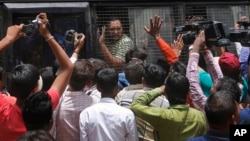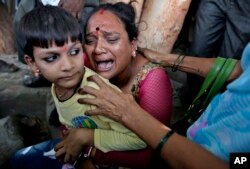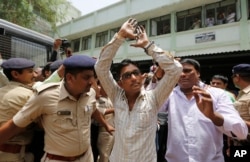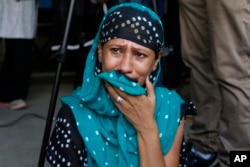An Indian court has handed down life terms to 11 Hindus convicted of murder in one of the massacres during deadly riots that swept India’s Gujarat state 16 years ago when Prime Minister Narendra Modi headed the state administration.
Twelve others, found guilty of lesser crimes, were sentenced by the special court to seven years in jail, while one man was given a 10-year prison term.
Friday’s sentencing involved one of the worst episodes of violence in which a Hindu mob stormed a housing complex, Gulbarg Society, in Ahmedabad city where many Muslims had taken shelter. Sixty-nine people, including women and children, died. Some succumbed to burns, others were hacked with machetes.
Handing down the sentences, the judge called it the darkest day in the history of civil society.
The riots raged sporadically for nearly two months, killing more than 1,000 Muslims in the western Gujarat state. The violence was triggered by the death of 60 Hindu pilgrims in a train blaze that was initially blamed on Muslims, but later found to be the result of an accident.
One of those who died in Gulbarg Society was a member of parliament from the opposition Congress party, Ehsan Jafri. His widow, Zakia Jafri, says he repeatedly tried to call the police, but by the time they came, homes had been set on fire any many killed.
Tougher sentences
After the court handed down the sentences, a disappointed Zakia Jafri said the convicts got off too lightly. “I am not at all satisfied with this. This is not justice,” she said.
Prosecutors had sought death for the convicted, but defense lawyers argued they were not hardened criminals or terrorists and the mob violence did not involve the “rarest of rare cases” for which the death penalty is reserved.
Teesta Setalvad, a human rights activist who has spearheaded a campaign to prosecute officials in Gujarat for their alleged involvement in the riots, said they will appeal to a higher court. “They were part of a willfully armed mob that was on the attack from 9 a.m. right up to to 5 p.m. There is no reason for such leniency,” she said.
Pending cases
Two more cases involving the riots are still pending in courts. One of them seeks to establish that the riots were the result of a high-level conspiracy involving Modi. In the case involving Friday's sentencing, however, the judge has rejected charges of conspiracy and called the housing society massacre an incident of mob violence.
Critics and opposition parties have long accused Modi, who was chief minister of Gujarat during the riots, of not doing enough to stop the religious violence. But in 2013, a Supreme Court panel concluded there was not sufficient evidence to prosecute him.
For nearly a decade, the United States and some Western countries banned his entry to their countries on charges of human rights violations in his state.
While Modi successfully put behind all such allegations and swept the 2014 national elections, critics say erasing the memory of the riots in his home state will not be easy.







